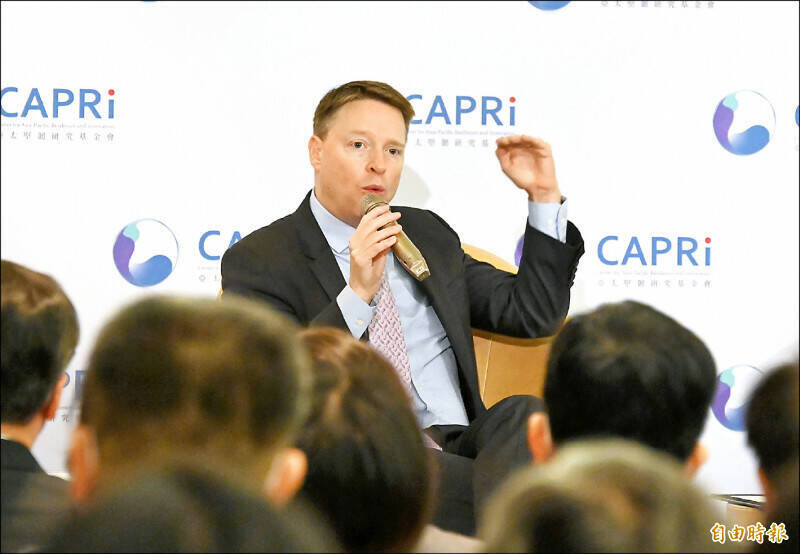Bo Ming is currently the chairman of the China project of the American think tank Foundation for Defense of Democracies. The picture shows Bo Ming visited Taiwan last week to attend the CAPRI speech event.
(file photo)
[Reporter Lu Yixuan/Taipei Report] Former U.S. deputy national security adviser Matt Pottinger said today that he does not believe that the so-called "silicon shield" concept exists. In fact, China's political propaganda conveys a negative message: "Semiconductor capabilities are exactly what Beijing covets. One of the reasons for Taiwan".
What we have to do is stop the invasion at all costs and let China know that things are not what they want, a Beijing invasion would destroy Taiwan's semiconductor manufacturing capabilities, and even if it doesn't destroy that equipment, it won't work well, let alone other countries will not let Beijing Gain a dominant position in the semiconductor field.
Bo Ming is currently the chairman of the China project of the American think tank Foundation for Defense of Democracies. Today, when responding to media questions through video, he talked about the context of TSMC's establishment of a factory in the United States and his views on "Silicon Shield".
Please read on...
Pomin pointed out that one of the focuses of Chinese President Xi Jinping and the CCP’s attempt to gain dominating economic influence over other countries is to develop semiconductor design and manufacturing, which can also be seen in China’s 14th “Five-Year Plan” .
Beijing wants to control semiconductor manufacturing so it no longer has to rely on imports from Taiwan, the US or the rest of the world.
Bo Ming analyzed, but what goes one step further than the CCP's desire to break through "being stuck by the West" is that semiconductors are the intersection of all key technologies in this century, whether it is biotechnology, artificial intelligence or the Internet, all rely on chips. In other words, "in the advanced Once semiconductors gain dominance, they can hold other countries’ economies hostage,” just as China has been trying to hold Australia hostage and force political concessions through embargoes for the past two years.
Bomin emphasized that the United States does not want Beijing to gain influence that may endanger our economic prosperity, which is a bipartisan consensus.
The Biden administration has imposed export controls in an attempt to thwart Beijing's strategic ambitions.
At the same time, the U.S. is working hard to increase its own semiconductor manufacturing capacity, which could crack Beijing's thinking about whether it can really achieve a monopoly, which he believes is a good direction.
In fact, Taiwan and the United States are closely related to the semiconductor industry. Many American companies are leaders in design. Taiwan has very good chip design companies and world-leading foundries.
TSMC's establishment of a factory in the United States can further integrate industrial cooperation and curb Beijing's idea of invading Taiwan and dominating the semiconductor manufacturing industry.
Bo Ming bluntly said that the concept of "silicon shield" is very popular recently, but "I don't think there is such a thing."
He pointed out that the thinking of a Leninist dictatorship is far from rational, democratic people or corporate thinking, so we should not deceive ourselves into thinking that there is a so-called "silicon shield".
Instead, the Chinese government's propaganda conveys the opposite message: "Taiwan's leading position in the semiconductor industry is one of the reasons why Beijing should invade Taiwan."
Whether or not they actually believed the propaganda was one thing, Pomin said, but the idea was utterly insane because Beijing would basically destroy Taiwan's semiconductor manufacturing capabilities, and even if it didn't destroy that equipment, it wouldn't work well.
Boming reiterated that what the United States and Taiwan have to do is to stop the invasion at all costs and let China know that things are not what they want. The delusional thinking of Taiwan's semiconductor manufacturing capabilities.
